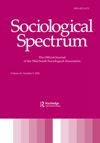美国可再生能源消费的驱动力——对1997年至2019年数据的纵向分析
IF 1.1
3区 社会学
Q2 SOCIOLOGY
引用次数: 2
摘要
摘要气候变化是当今美国面临的一大挑战。近年来,极端天气事件激增,对经济和环境造成了毁灭性影响。气候变化的一个主要原因是化石燃料消耗产生的二氧化碳排放。推广可再生能源是在满足能源需求的同时减少这些排放的一条切实可行的途径。本研究调查了美国可再生能源消费的驱动力。这些数据是一个平衡的面板,包括1997年至2019年50个州和华盛顿特区的指标。采用时间序列Prais–Winsten回归进行统计估计。结果表明,当碳密集型经济体较少,气候变化影响更大时,各州会消耗更多的可再生能源。此外,可再生能源组合标准是促进可再生能源消费的有效政策工具。研究结果补充了现有文献,并具有政策意义。值得注意的是,当各州的经济与化石燃料的交织程度较低,并且制定了相关政策来激励可再生能源时,各州就会支持可再生能源。本文章由计算机程序翻译,如有差异,请以英文原文为准。
The driving forces of U.S. renewable energy consumption—a longitudinal analysis of data from 1997 to 2019
Abstract Climate change is a major challenge facing the United States today. Recent years have witnessed a surge of extreme weather events that brought devastating impacts on the economy and environment. One major contributor to climate change is CO2 emissions produced from fossil fuel consumption. Promoting renewable energy is one practical pathway to mitigate these emissions while also meeting energy demands. This study investigates the driving forces of U.S. renewable energy consumption. The data are a balanced panel that includes indicators for 50 states and Washington, DC, from 1997 to 2019. The time-series Prais–Winsten regression is adopted for statistical estimation. Results show that states consume more renewable energy when they have less carbon-intensive economies and suffer more climate change impacts. Also, the renewable portfolio standards represent an effective policy instrument to promote renewable consumption. The findings complement existing literature and carry policy implications. Notably, states become supportive of renewable energy when their economies are less intertwined with fossil fuels and relevant policies are in place to provide incentives for renewables.
求助全文
通过发布文献求助,成功后即可免费获取论文全文。
去求助
来源期刊

Sociological Spectrum
SOCIOLOGY-
CiteScore
3.80
自引率
5.60%
发文量
16
期刊介绍:
Sociological Spectrum publishes papers on theoretical, methodological, quantitative and qualitative research, and applied research in areas of sociology, social psychology, anthropology, and political science.
 求助内容:
求助内容: 应助结果提醒方式:
应助结果提醒方式:


